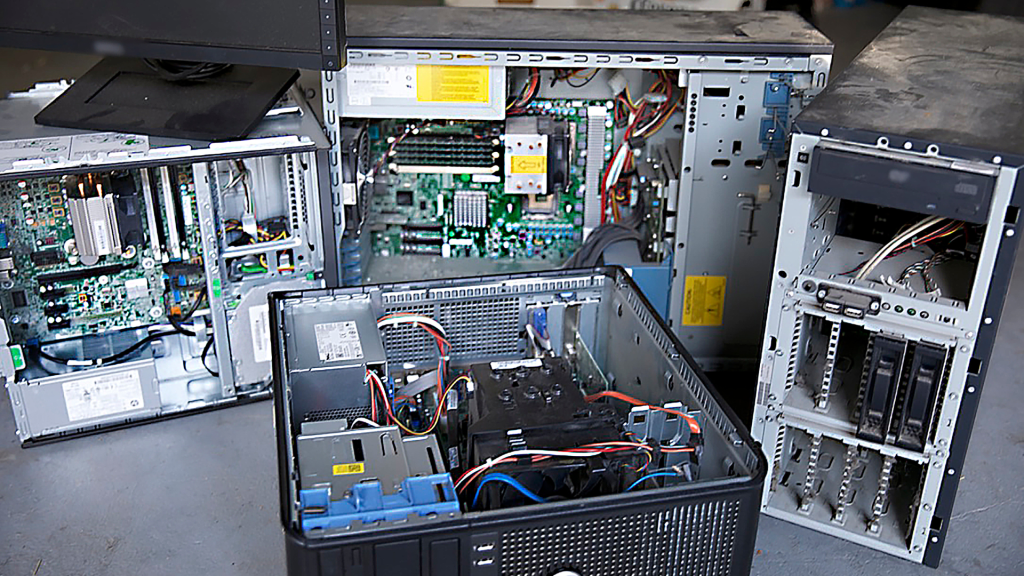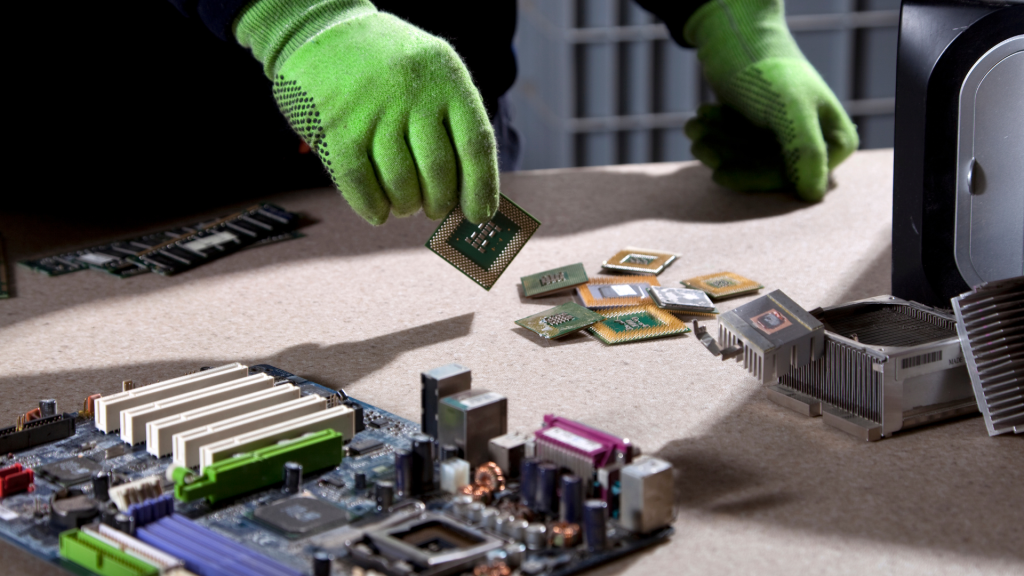Electronics recyclers are increasingly focused on sustainability, including reducing their carbon footprint, minimizing waste, and promoting environmentally responsible practices throughout the supply chain. At the forefront of the circular economy, recyclers also play a critical role in extending the life of electronic products through repair and refurbishment. Due to the sensitive nature of information found on most personal electronics, however, electronics recyclers also serve as the frontline defense for electronics recycling data security,
The increasing frequency of cyber-attacks demands that companies ensure proper data destruction when handling end-of-life (EOL) electronic equipment. Data security remains a key concern for electronics recyclers, as electronic devices contain sensitive personal or business data. This data requires proper handling and destruction to prevent data breaches.
To mitigate data and cybersecurity risks, working with reputable recycling companies that follow proper data destruction protocols is important. Failure to properly handle data stored on EOL electronic devices and components creates significant security risks and fuels the growing counterfeit electronic problem.
E-Waste Fuels the Counterfeit Electronics Problem
When electronic devices are recycled, they often still contain sensitive information. If not properly destroyed, cybercriminals can access personal and business data. This can result in data breaches, identity theft, and other forms of cybercrime.
Improper disposal of electronic components also opens doors to counterfeiters. Counterfeit electronics represent one of the electronics industry’s biggest challenges.
One of the most common methods that counterfeit manufacturers employ for obtaining sensitive information begins with acquiring legitimate, proprietary electronic components that have been discarded as electronic waste.
Counterfeiters use concealment methods such as surface sanding and acid washes to remove branding and identification information on the surface of disposed-of electronics. After the concealment process, counterfeiters rebrand components and sell them as original parts. This practice represents more than a financial threat to original manufacturers. Original parts processed this way pose safety and security risks to users and organizations.
Improper disposal of e-waste also provides opportunities for counterfeiters to acquire critical proprietary data. These files offer counterfeiters access to information such as specs and blueprints necessary to recreate counterfeit versions of electronic products. Unfortunately, these copies are manufactured without oversight or quality control, putting end users at risk.
Read our post about e-waste here.
Electronic Components Most Likely to Compromise Security

Electronic components often contain critically sensitive information. Components most likely to store personal or sensitive information include:
- Memory cards
- USB drives
- Smartphones
- Solid State Drives (SDDs)
- Hard Disk Drives (HDDs)
Each component functions as a storage mechanism within electronic devices and systems. As a result of these functions, the above electronic components represent the most significant risk to data security when companies dispose of end-of-life electronic devices and components.
Sensitive information may also be stored in other electronic components. Though printers, scanners, and copiers operate as output devices, their built-in networking capabilities and modern ‘smart’ features result in information storage. As a result of these stored data files, even outdated printers and copiers pose potential security risks.
Semiconductors also represent data security challenges for end-of-life (EOD) disposal. Semiconductors may store personal and financial data, login credentials, and other confidential information.
Deleting and Wiping Practices Only Create the Appearance of Data Security
Deleting files or formatting devices creates the appearance of data removal. Still, even these steps fail to remove sensitive information permanently.
Data wiping, for example, does not remove all data from an HDD or SDD but simply removes the index and pointer files that allow users to find and access sensitive files. However, advanced computer users employ several different techniques that provide access to information not otherwise indexed.
Interested in Cyber Security? Check out our blog on Cyber Security for small businesses here!
Specialized Electronics Recycling Data Security Techniques Provide Permanent Data Removal

Before recycling EOL devices or electronic components, companies must first take steps to prevent unauthorized access and data breaches.
Specialized data destruction techniques offer the most effective approach to the permanent removal of sensitive data. These techniques include:
- Shredding – Irreversible file destruction method using an industrial-level shredder to destroy a hard drive physically.
- Degaussing – Erases all data on a hard drive using a magnetic force stronger than the hard drive’s magnetic field.
The most effective approach to data protection when recycling electronic components includes a multi-step process that permanently erases sensitive data and physically destroys the components housing that information.
Recognize a Reputable Recycler By Their Certifications
Improperly encrypted or wiped computers serve a smorgasbord of personal information ripe for the plucking. In fact, personal information is so readily available that the going price for personal information files has dropped. Investigations exposing the bidding circles where these files go to market discovered that the going price of a single Social Security Number hovers around $1, with complete data sets running at just $3.
Working with a reputable recycler for proper disposal of e-waste offers companies the best protection from data breaches and cybersecurity risks. Several industry certifications identify responsible recyclers to ensure companies and organizations partner with recycling facilities capable of providing the data security measures necessary for regulatory compliance.
SOC2 Certification
System and Organization Controls 2 certification, or SOC2, indicates that independent auditors have evaluated and judged effectively a company’s security policies, procedures, and controls in place to protect sensitive information. Developed by the American Institute of Certified Public Accountants (AICPA), SOC2 certification rests on five key principles: security, availability, processing integrity, confidentiality, and privacy.
Recyclers seeking SOC2 certification must first demonstrate existing controls that effectively meet each of these principles. The process involves a thorough audit by an independent auditor trained to assess internal controls, technology systems, and risk management practices.
R2 Certification
R2 certification, also known as Responsible Recycling Certification, is a voluntary program for electronics recyclers demonstrating their commitment to responsible environmental and social practices.
The R2 standard covers the entire lifecycle of electronic devices, from the point of collection to the final disposition of the materials. It requires electronics recyclers to implement best practices for data security, including the secure erasure or destruction of all data-containing devices. It also requires recyclers to follow best practices for the handling, processing, and management of hazardous materials and to implement responsible downstream management practices, such as tracking and auditing the final disposition of materials.
Electronics recyclers undergo a rigorous audit process by an accredited third-party certification body to obtain R2 certification. The audit process evaluates the recycler’s compliance with the R2:2013 Standard. The latest version of this standard outlines 13 requirements across environmental health and safety, data security, and downstream management of materials.
e-Steward Certification
e-Stewards certification is a global e-waste recycling and refurbishment standard developed by the Basel Action Network (BAN), a non-profit organization dedicated to promoting the responsible management of electronic waste.
The e-Stewards certification is a voluntary program that requires certified recyclers to adhere to strict environmental and social standards. Electronics recyclers seeking certification undergo a rigorous audit process that evaluates the recycler’s compliance with the E-Stewards standard requirements for environmental health and safety, data security, and responsible downstream management of materials.
The e-Stewards standard requires electronics recyclers to implement best practices for data security, including the secure erasure or destruction of all data-containing devices. The certification also imposes an e-waste export ban, prohibiting certified recyclers from exporting e-waste to third-world countries.
Identifying and partnering with a reputable electronics recycler is critical at every level of the electronics industry. With our industry’s fast pace of progress and sensitive nature, this partnership is essential.
If you’re looking for B2B components and parts, search over 300 million products from many sources here!
Building Partnerships Protects Electronics Recycling Data Security

To find the right recycling partner for your business, ask for detailed information about the recycler’s data destruction policy and practices. Ensure your recycling partner incorporates a multi-step process for the thorough and permanent destruction of sensitive data. Consider adding stipulations to your contract requiring a certificate of hard drive destruction.
Interested in the latest trends and innovations in technology? The Mectronic blog is your source for trusted insight into the technology world. Check our blog for regular updates!

Mectronic has been connecting sellers and buyers for 25 years. With powerful search tools and over 300 million products, Mectronic helps you find the B2B components you need from sources you trust. Find the parts and components you need today here!

